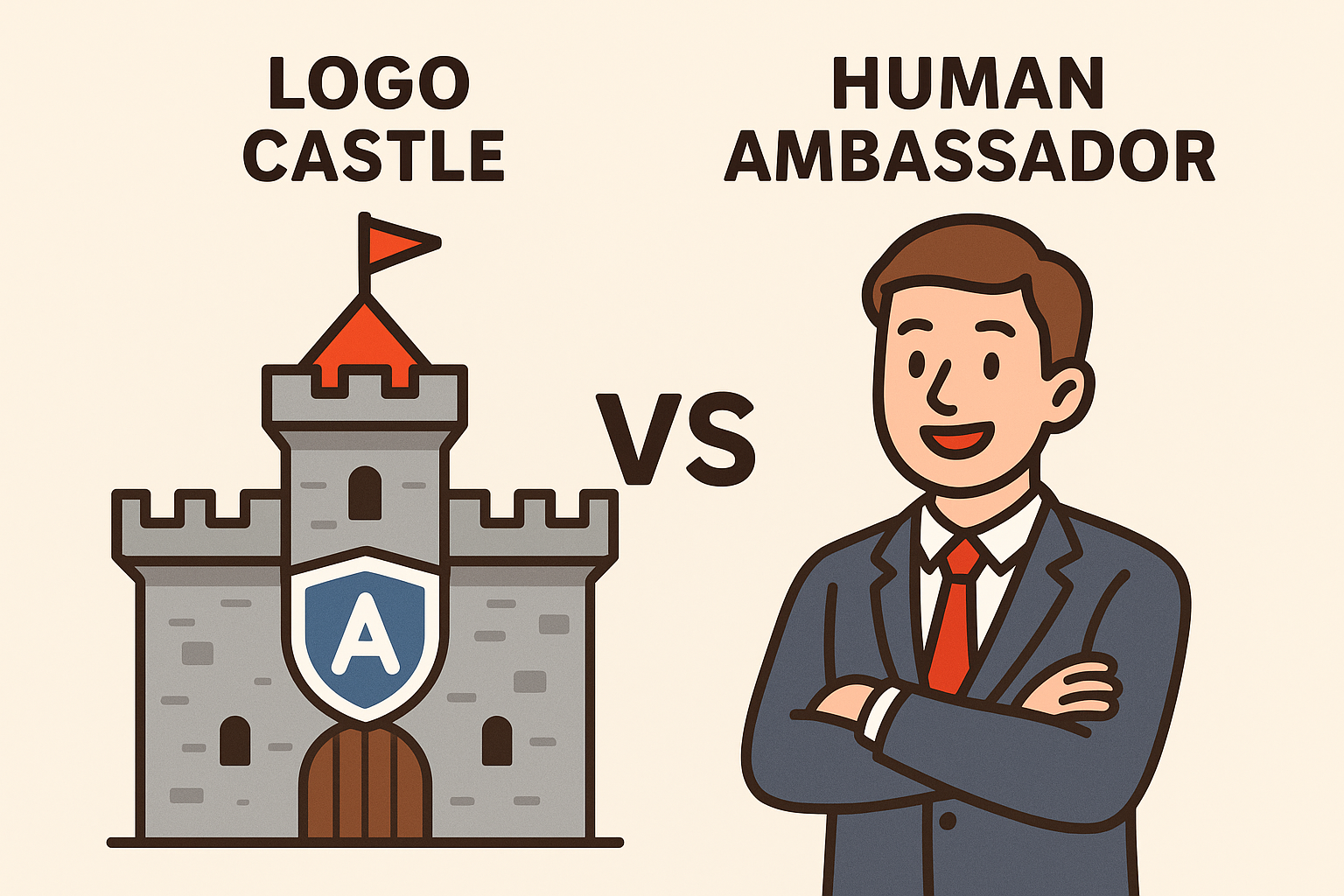Forget the Castle—In B2B, It’s the Jester Who Wins the Crow
For decades, the B2B rulebook had one shining commandment: “Thou shalt worship the company brand.”
The company was the castle—big, shiny, full of banners, and expensive defenses. Logos, websites, case studies, mission statements, and corporate videos were its walls. Inside, the employees were more like medieval peasants: anonymous, loyal, and entirely replaceable. We believed if the castle was tall enough and polished enough, buyers would bow before it.
But here’s the plot twist: the castle era is over. Buyers don’t want to talk to stone walls anymore. They want to talk to the human standing outside the gate, preferably someone who doesn’t sound like a brochure.
That’s why in today’s B2B world, the founder’s voice—the personal brand—is the real MVP. The ambassador now outranks the fortress. Ignore this, and you risk becoming the proud owner of a very pretty but very empty castle.
Logos Don’t Close Deals, People Do
Buyers today spend only 17% of their time talking to suppliers. The rest of the time, they’re creeping on LinkedIn, watching your videos, or checking out your posts. By the time they actually talk to you, they’ve already made up their minds about whether you’re legit.
So, who do they trust? Not the faceless company logo that says “We are innovative.” They trust the human who admits mistakes, shares lessons, and actually sounds like they’ve lived through the war of building something.
Gong: The Castle + The Ambassador Combo
Take Gong.io. The company brand (the castle) is rock-solid—great website, ROI calculators, case studies, the works. But the magic came from Amit Bendov, the CEO.
He didn’t just post shiny updates—he shared “brutal truths” about leadership, scaling pains, and life lessons. That’s what made Gong a category creator. People trusted Amit first. Gong (the castle) just had to prove he wasn’t bluffing.
Zerodha: Fitness, Finance & Philosophy
Now look at Zerodha. The company brand is iron-clad in trust and transparency. But it’s Nithin Kamath, the founder, who made people believe. While his company sells trading platforms, he often posts about fitness, long-term investing, or climate change. He isn’t pitching features—he’s building philosophy.
Millions trust Zerodha because they trust Nithin. Simple.
Why People Beat Castles Every Time
Authenticity: A company reports numbers. A founder tells you about the time they almost crashed and burned. Which one do you remember?
Speed: Companies move like cargo ships. Founders with personal brands move like speedboats. They can jump into trends instantly.
The Halo Effect: If you trust the person, you trust everything attached to them. Even their castle.
The Company Brand Still Matters (But It’s the Backup Singer)
Don’t burn your logo just yet. The company brand is still crucial—but it’s the proof, not the promise.
The personal brand is the promise.
The company brand is the evidence.
The ambassador opens the door; the castle seals the deal.
How to Build Your Personal Brand (Without Sounding Like a Robot)
Blueprint Your Voice: What hill will you die on? What’s your spicy take on the industry?
Fix Your LinkedIn Profile: It’s not a résumé; it’s your digital stage. Your headline should scream value, not job title.
Post Like a Human: Stop promoting. Start storytelling. Share your why, your how, and your “what if.”
Final Word: Drop the Drawbridge
Automation and AI might be taking over tasks, but the one thing they can’t replicate is your human touch. Buyers crave connection. They want a real person they can trust.
The future of B2B is personal. Lead with your ambassador. Keep the castle polished. And don’t forget—the jester who tells the best story often wins the kingdom.

